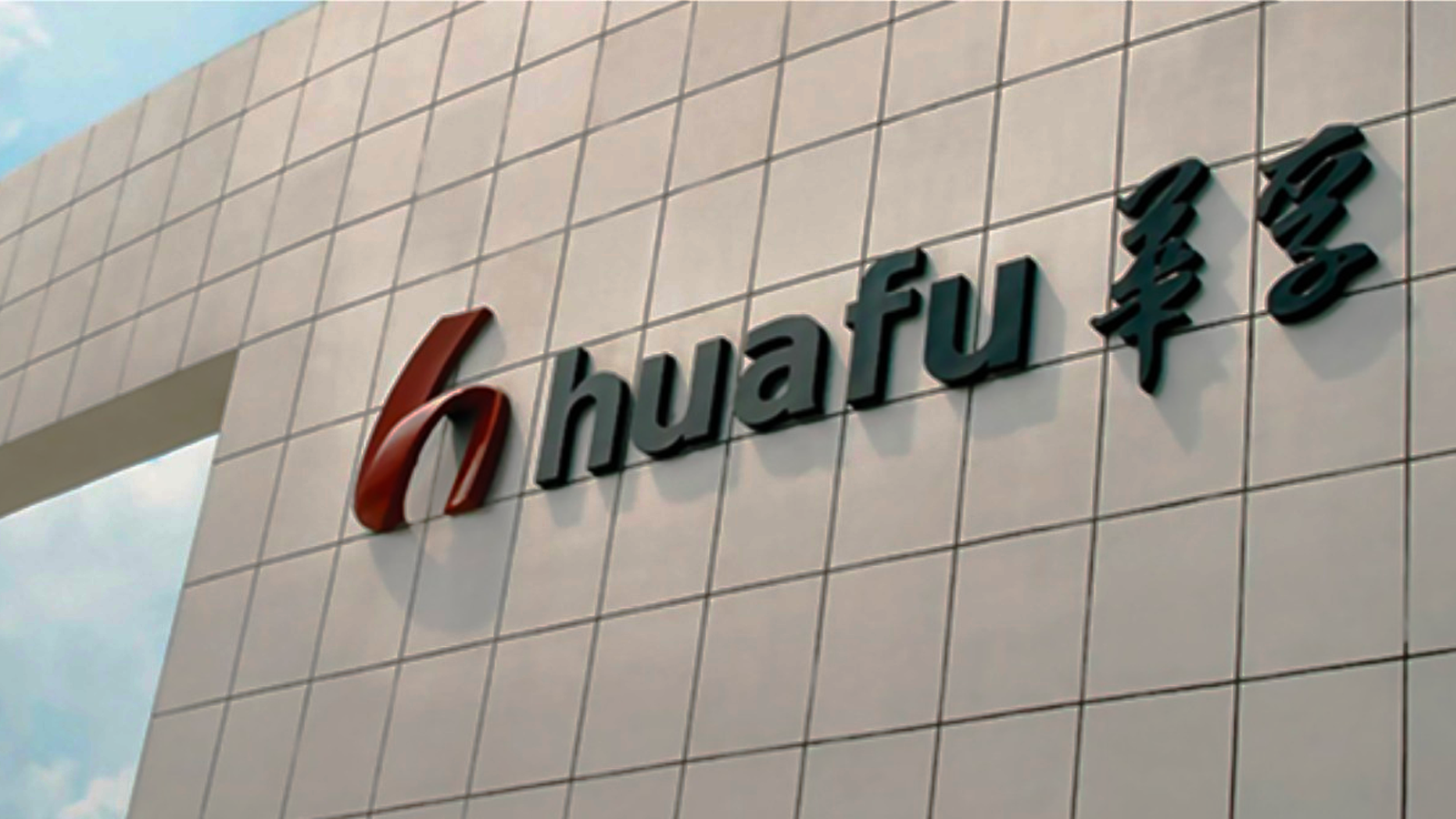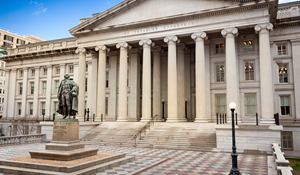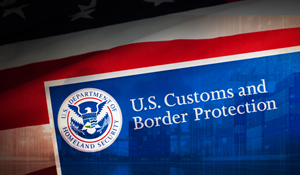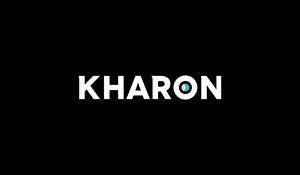By Edmund Xu and Samuel Rubenfeld
May 28, 2020
A Xinjiang-based textile company is one of many apparel manufacturing firms supplying materials to global retailers while operating from industrial parks that have raised concerns about potential human rights violations through their surveillance and re-education programs.
Aksu Huafu Textiles Co. will be added to the Entity List for engaging in human rights violations and abuses in Xinjiang, an autonomous region of China home to a wide array of ethnic groups, including Uighur Muslims, the U.S. Commerce Department’s Bureau of Industry of Security (BIS) said Friday.
The U.S. didn’t specify the company’s conduct in its statement, but said it was one of the parties complicit in abuses committed as part of China’s campaign of repression against Uighurs, ethnic Kazakhs and other Muslim groups in Xinjiang.
Aksu Huafu Textiles’ parent company, Chinese manufacturer Huafu Fashion Co., has been investing in Xinjiang since 2006 and now has an annual output of 189,000 tons of yarn, according to its website. In 2018 in Xinjiang, Huafu Fashion opened the world’s largest textile mill for melange yarn, a type of blended yarn involving two or more mixed colors, knitting- and fashion-trade media outlets reported.
The U.S. move against Aksu Huafu Textiles comes amid rising tensions between the U.S. and China over multiple issues, including Beijing’s treatment of the Uighur population. The U.S. Congress has passed legislation that would impose sanctions on Chinese officials for human rights abuses against Uighurs; President Donald Trump hasn’t committed yet to signing the legislation, saying Tuesday it was being reviewed at the White House.
China’s foreign ministry on Monday accused the U.S. of interfering with China’s domestic affairs in violation of “basic international norms,” and expressed “strong dissatisfaction” and “firm opposition” to the U.S. move against companies operating in Xinjiang, saying the government operations there are “counter-terrorism measures.”
Huafu Fashion said Monday in a statement posted to the Shenzhen Stock Exchange that the listing by BIS won’t affect the company’s day-to-day operations. The “listing is an irresponsible action with no consideration of the facts" the company added.
The BIS listing restricts U.S. exports to the company by imposing a license requirement. Alongside Aksu Huafu Textiles, BIS listed a Xinjiang public security institute and seven companies involved in China’s surveillance effort in Xinjiang. In a separate action on Friday, BIS also announced the impending addition of 24 companies to the Entity List for their involvement in supporting Chinese military end-use procurement; several of the companies condemned the action over the weekend in statements cited in a report from the South China Morning Post. The BIS listings go into effect once published in the Federal Register.
Beijing has engaged in a mass surveillance effort in Xinjiang, aided in part by U.S. technology, Kharon reported in April. BIS added multiple firms to the Entity List in October 2019 for enabling the surveillance. Among the other seven companies added Friday for their roles in surveillance were NetPosa and its subsidiary SenseNets, which has a database containing the location and personal data of Uighurs that was discovered by a Dutch researcher. Netposa said in a statement on Saturday that the listing would not have a substantial impact on its day-to-day activities, and that the company does not conduct any business with the U.S.
China has detained Uighurs at “vocational education and training centers“ (VETCs) before placing them at factories largely concentrated in consumer goods and textile manufacturing. At the centers, detainees spend their days learning Mandarin, Chinese law and vocational skills, according to media reports. Beijing has said the VETCs are voluntary, that the “students” are treated well and can leave when they please. In December, a top Xinjiang security official said those detained in the VETCs had “graduated,” though observers were skeptical.
Chinese authorities have held at least 800,000, and potentially up to 2 million, people since April 2017 at the VETCs and other facilities, according to U.S. government assessments and human-rights groups. The VETCs serve as a foundation of a system of forced labor in Xinjiang, leaked Chinese government documents show.
Factories located in detention facilities or industrial parks connected to government re-education efforts, as well as companies engaging in “vocational training” as part of the “Xinjiang Aid” poverty alleviation program, are red flags indicative of Uighur forced labor, according to a report issued in March by the U.S. Congressional-Executive Commission on China.
Citing U.S. government and non-profit experts, a joint statement from apparel trade groups in March said the conditions in Xinjiang and the treatment of minority workers “present profound challenges to the integrity of the global supply chain.” The statement urged the U.S. government to engage a multi-stakeholder working group to assess the problem and find workable solutions.
“Accepting the status quo is not an option,” the statement said. “While we are taking action, our industry cannot solve this alone.”
‘They Say It’s a Secret’
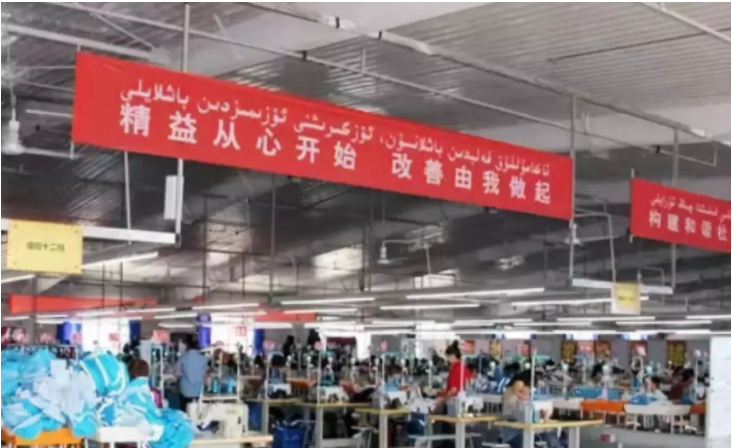
Aksu Huafu Textiles is one of several subsidiaries of publicly traded apparel conglomerates that operate in the same industrial park, called Aksu Textiles Industrial City, in Aksu, Xinjiang.
The park is billed as a “transformational model to improve the quality of vocational training,” according to a 2016 Xinjiang government article. Aksu Textiles Industrial City in 2019 was on track to produce more than RMB 10 billion (USD 1.4 billion) worth of goods, according to a recent textiles industry report.
Local residents who are “recruited” as workers in the industrial park must undergo Mandarin training programs, as well as vocational skills training to “improve their overall character,” the government article said. The training center also took steps to improve the effectiveness of vocational training, including strengthening “regular training inspections” and “recording trainees’ information in a management system,” according to the government article.
Huafu Fashion trades on the Shenzhen Stock Exchange and received RMB 652 million in government subsidies in 2019, much of it coming from local agencies in Xinjiang, the company disclosed in its annual report. The company’s founder and chairman, Sun Weiting, is also the legal representative of the Huafu Textiles Vocational Training School located in the industrial park, corporate records show. The vocational training school was founded in 2013 to train locals in textile skills, and it was the first such school to receive approval from the Aksu government, local media reported at the time.
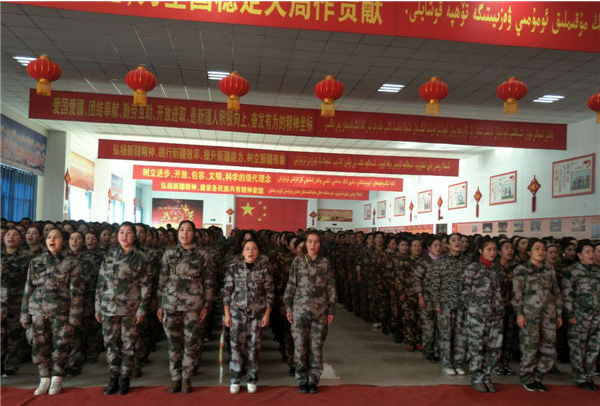
A December 2017 press release on Huafu Fashion’s website showed an image of 600 new workers in Aksu, assembled in neat rows and wearing military camouflage while singing the national anthem under propaganda banners. Aksu Huafu Fashion “energetically works with the government to absorb surplus labor and organize teachers to provide training to gradually turn farmers into industrial workers,” the press release said.
With officials hovering nearby, a Huafu worker in Aksu told a reporter from The Wall Street Journal in May 2019 that she had been in a “training center,” and that “before I used to have extremist thoughts, but now they’re all gone.” The worker was then taken by officials into a room in an adjacent restaurant, and returned to say: “They say it’s secret. Even speaking of it is not allowed.” Huafu told WSJ its labor-management system complies with international regulations, and that its training program is mandatory for all workers, regardless of ethnicity or religion.
Yarn made by Aksu Huafu Textiles in Xinjiang goes to factories elsewhere in China, as well as Bangladesh and Cambodia, appearing in the supply chains of several companies, the WSJ report said. Hong Kong clothing brand Esprit admitted to using cotton from a Huafu mill in Aksu and committed to stop sourcing from that location, according to statements to the BBC. Retailer H&M told the BBC that their probe into Aksu Huafu Textiles showed “no evidence of forced labor.”
Another company based at the industrial park, Aksu Lianfa Textile Co., Ltd., directly exports to the U.S., available trade data show, although it is unclear who the U.S. importers were.
Aksu Lianfa Textile is a subsidiary of publicly traded conglomerate Jiangsu Lianfa Textile Co., Ltd., which earned more than USD 160 million in revenue from the U.S. and European markets in 2019, financial disclosures show. Jiangsu Lianfa has supplied Individualized Shirt Company, one of the largest U.S. custom shirt makers, with thousands of kilograms of cotton fabric in the past few years, according to trade records.
Jiangsu Lianfa said in its 2018 annual report that it does not engage in any poverty alleviation efforts, despite winning a national poverty alleviation award that same year, a Center for Strategic International Studies report found.
And Chinese apparel conglomerate Youngor Group, one of China’s largest apparel companies, also has two Aksu-based subsidiaries that are located in the industrial park.
One of the subsidiaries boasted ties with leading fashion brands in Europe and the U.S. in a now-removed post on its website. Youngor Group also signed a deal in 2007 to bring the Hart Schaffner Marx brand, a leading U.S. men’s suit maker, to China. One of Youngor’s Aksu-based subsidiaries held a “deradicalization” session for 240 workers in May 2017 at the request of the industrial park’s management, a WSJ report said. Workers were told not to pray in public or own books with ethnic or religious content, and that the company would tighten oversight on the workers’ internet usage.
Youngor Group has been involved in other suspect labor practices. The manager of a Youngor subsidiary in Hunchun, China, near the border of North Korea, said the company employed more than 3,000 North Korean laborers due to their “low cost and superior quality,” according to an interview he gave for an October 2018 report from Charhar Institute, a Chinese think tank. United Nations sanctions that came into effect late last year prohibit the hiring of North Korean workers.
Other factories based in industrial parks with ties to government-run vocational training and re-education programs also produce goods for companies located in the U.S. or sell their products there, according to media reports, corporate records and other publicly available information reviewed by Kharon.
Mannequins Direct from Xinjiang
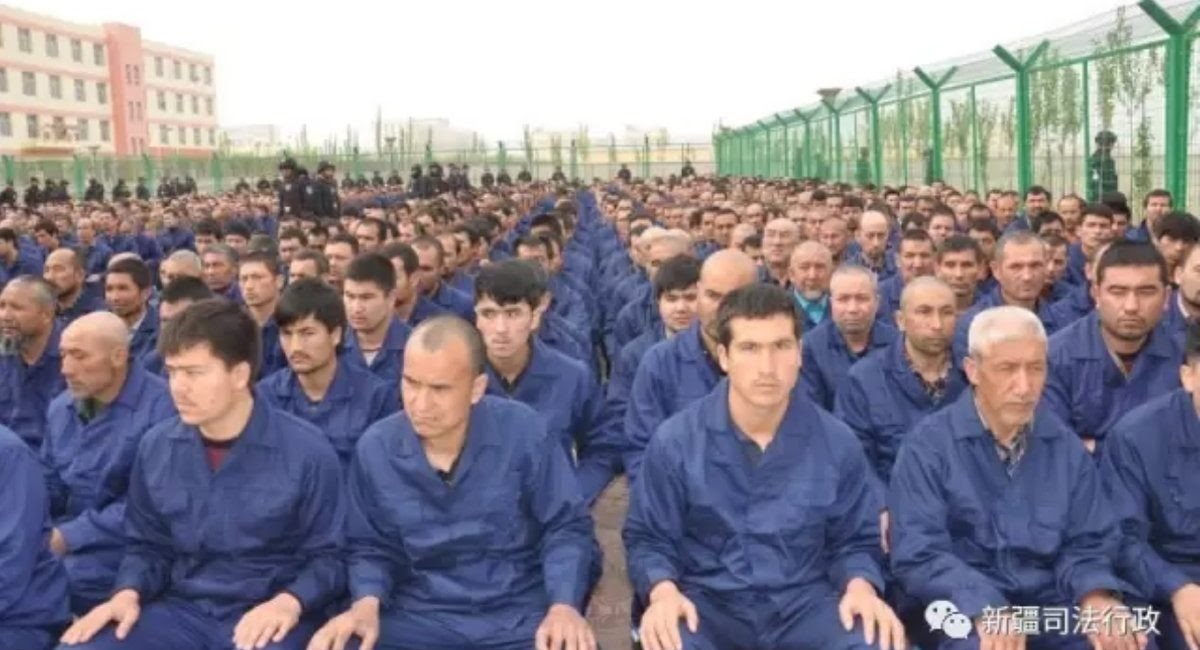
The Beijing Industrial Zone in Xinjiang’s Lop County was the site of a widely circulated image posted by Xinjiang’s Ministry of Justice in April 2017 that shows Uighur detainees listening to a “deradicalization speech,” according to an investigation by Uighur-American journalist Shohret Hoshur.
Among the companies registered at the Beijing Industrial Zone in Lop County include two manufacturers of hair products and accessories that recently shipped goods to U.S. firms, according to shipping records.
One of the firms, Lop County Meixin Hair Products Co., Ltd., shipped over 1,000 kilograms of wigs and mannequin heads to U.S. firms in Los Angeles and Miami, with the most recent shipments arriving in February 2020, trade records show.
The other company, Hetian Haolin Hair Accessories, in the past year shipped more than 150,000 kilograms of wigs to two U.S. firms directly from its Beijing Industrial Zone address, trade records show. One of the U.S. firms markets its hair products on Amazon.
‘Double the Time and Effort’
At least two Chinese clothing manufacturers have maintained relationships with a vocational high school in Yengisar County, in southwest Xinjiang, according to local media reports. Both firms are owned by vendors to global retailers.
Yengisar Vocational High School has partnered with a local clothing manufacturer, Xinjiang Xirong Clothing Co., Ltd., to supply student labor under an “internship” program, according to August 2019 Chinese media reporting. The internship program has been ongoing since at least March 2017, when local media reported on a group of 300 Yengisar Vocational High School students being sent to Xinjiang Xirong Clothing for more than five months of training.
A company manager told a Chinese reporter that the company’s Xinjiang workers take “double the time and effort to train” primarily because of language difficulties but that the company persists as part of their participation in the government’s “Xinjiang Aid” policy.
Xinjiang Xirong Clothing, an apparel manufacturer, is a wholly owned subsidiary of Qingdao-based Jifa Group, a supplier for Japan-based Fast Retailing Co., Ltd, which owns the popular Uniqlo clothing brand sold globally.
One student at the company said during an interview with local media that she was “using her work break to study the curriculum of her national language (Chinese) courses.”
Testimonies from detainees of Xinjiang’s vocational training centers indicate that forced enrollment in Chinese language courses are a common aspect of the centers’ curriculum, an assertion backed up by a 2018 provincial government regulation that called for language education as one of the methods to counteract “extremist ideology” and to psychologically and behaviorally “correct” vocational center students.
Though there is no direct evidence that Yengisar Vocational High School is a vocational training center, local authorities have been transforming vocational schools into internment compounds, according to evidence cited in a November 2019 report by Adrian Zenz in the peer-reviewed Journal of Political Risk.
Jifa Group’s import and export subsidiary in Qingdao, China, has regularly supplied Uniqlo units in the U.S. and Canada with thousands of kilograms of clothing since at least 2017, trade records show.
None of the goods in these shipments can definitively be sourced to Jifa’s operations in Xinjiang, however. Uniqlo was one of 83 brands named in a recent report by the Australian Strategic Policy Institute (ASPI) as benefiting from Uighur labor outside Xinjiang. The company said, in response to that report, that none of its products were made in the region.
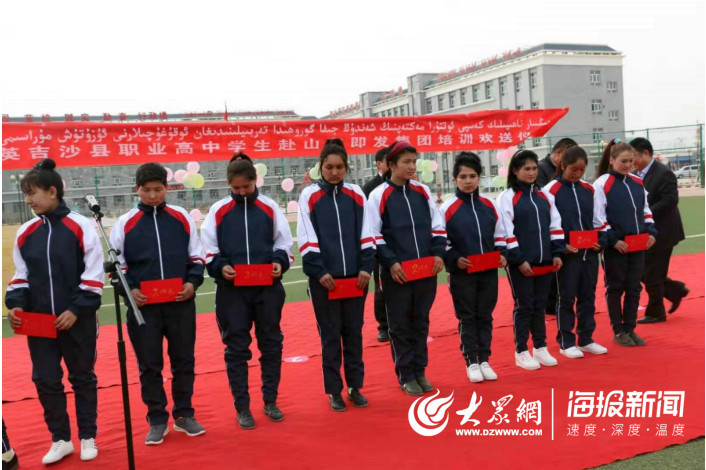
Even if Jifa Group did not export goods made in its Xinjiang subsidiary abroad, the company benefited directly from Uighur labor by working with Yengisar Vocational High School in Xinjiang as part of the government-supported “Xinjiang Aid” program, according to Chinese media reporting. Twenty-eight Uighur women arrived in March 2019 at Jifa Group’s headquarters in Qingdao to attend three months of hair-products technology training, according to a Chinese media report.
Chinese companies can engage in the Xinjiang Aid program by hiring Uighur workers for their factories outside of Xinjiang through labor transfer schemes, the ASPI report noted.
Yengisar Vocational High School is also working with Kashgar Zhongxin Glove Co., Ltd., a company located in the same industrial park as Xinjiang Xirong Clothing, to set up a “glove manufacturing management degree,” according to August 2019 media reports.
Zhongxing Glove’s parent company, Shandong Jianhua Zhongxing Glove Co., Ltd., has made at least 12 shipments of more than 12,000 kilograms of ski gloves to Walmart since 2017, with the most recent shipment in August 2019. Shandong Jianhua also shipped 20,000 kg of ski gloves last year to Bioworld Merchandising, which markets Harry Potter, Star Wars, and DC Comics-branded products on Amazon. Zhongxing Glove recently removed from its website reference to its Xinjiang-based factory as one of only two factories run by the company.
